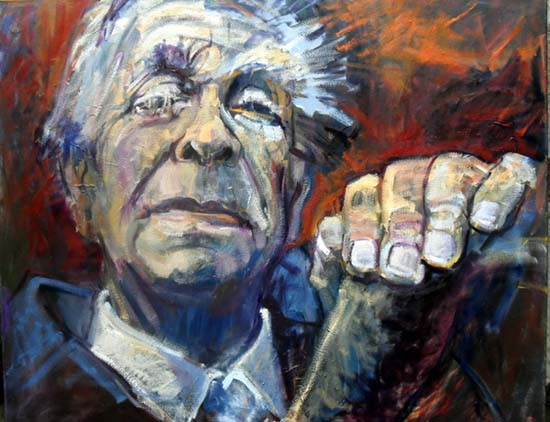Five Philosophical Poems of Jorge Luis Borges
Translated from the Spanish
by Evelyn Hooven (June 2018)

Jorge Luis Borges, Beti Alonso
The Argentine essayist, storyteller, and poet Jorge Luis Borges (1899-1986) was multi-lingual and truly embodied from early on a multi-cultural perspective. This compact selection comprises the foremost American Calvinist philosopher, Edwards, a rigorously inquiring Renaissance English thinker, Browne, and the transformative Jewish philosopher Spinoza. Borges, a philosopher himself in his modest way, was mysteriously attuned to the ways that memory may spring forth and attain several dimensions. Such an attunement was likely intensified by enhanced inwardness linked to the process of his losing sight. He was evolving his own version of what I’ll call the multi-temporal, including the Eternal (Everness, Ewigkeit).
Everness
Solely one thing is not; it’s oblivion.
God who saves the metal saves the dross
and stores up in His prophetic memory
the moons that will be and those that have been.
There everything is: thousands of reflections
that, between all forms of waning light,
your face has been leaving in mirrors
and the ones it will go on leaving, always.
And all is part of the diverse crystal
of this memory, the universe
whose arduous corridors have no end
and whose doors close themselves at your step;
only from the horizon’s other side
will you see the Archetypes and the Splendors.
Jonathan Edwards
Far from the city, far from the clamorous thoroughfare
and from time, which is mutable,
Edwards, now eternal, dreams and advances
in the shading of trees tinged with gold.
Today is tomorrow and is yesterday. There’s not
one thing of God’s in this serene ambience
that does not exalt him mysteriously,
gold of the afternoon or of the moon.
He counts it felicity for the world to be
an eternal instrument of wrath,
that the longed-for celestial was created
for very few, thus for nearly all, the inferno.
In the exact center of the gigantic web
there’s another prisoner—God, the Spider.
With Sir Thomas Browne (Religio Medici, 1643)
Defend me, Lord. (That I’m calling you
implicates No One. It’s only a word
from the drill the disengaged can use,
and this evening of dread, I write it.)
Defend me from me. They have also said this,
Montaigne and Browne and a Spaniard I don’t know;
something stays in me amid all this gold
that my darkening eyes still decipher.
Defend me, Lord, from an impatient
appetite for becoming marble or oblivion;
defend me from being what I have been,
the one I have been irreparably.
Not from the sword or the blood-stained lance
but, oh, protect me from expectation.
Baruch Spinoza
A topaz fog, western light
at the window. The careful manuscript
waits, already weighted by the infinite.
Someone in shadow constructs for the sake of God.
A man engenders God. He is a Jew
with sad eyes and olive-pallid skin;
time bears him as the river carries
a leaf in the waters that recede.
It doesn’t matter. The magical one endures
and works towards God with delicate geometry;
from his infirmity, out of nothing,
he keeps on building towards God with the word.
For him the most prodigious love, authorized—
the love that does not expect to be loved.
Ewigkeit
I turn in my mouth the Castilian verse
that says what always tends to be said
since the Latin of Seneca: horrendous
dictum that all we are is food for worms.
Let the pale ashes return to chant
the tales of death and of a victory
for that rhetorical queen who steps on
our standard banners, our empty glory.
Not so. Whatsoever has blessed this hide
I’m not going to deny like a coward.
I know that one thing is not: oblivion.
I know that in eternity it all lasts
and burns—the much and the precious that I’ve lost:
this forge of mine, that moon, this afternoon.
____________________________
Evelyn Hooven graduated from Mount Holyoke College and received her M.A. from Yale University, where she also studied at The Yale School of Drama. A member of the Dramatists’ Guild, she has had presentations of her verse dramas at several theatrical venues, including The Maxwell Anderson Playwrights Series in Greenwich, CT (after a state-wide competition) and The Poet’s Theatre in Cambridge, MA (result of a national competition). Her poems and translations from the French have appeared in ART TIMES, Chelsea, The Literary Review, THE SHOp: A Magazine of Poetry (in Ireland), The Tribeca Poetry Review, Vallum (in Montreal), and other journals, and her literary criticism in Oxford University’s Essays in Criticism.
More by Evelyn Hooven here.
Follow NER on Twitter @NERIconoclast